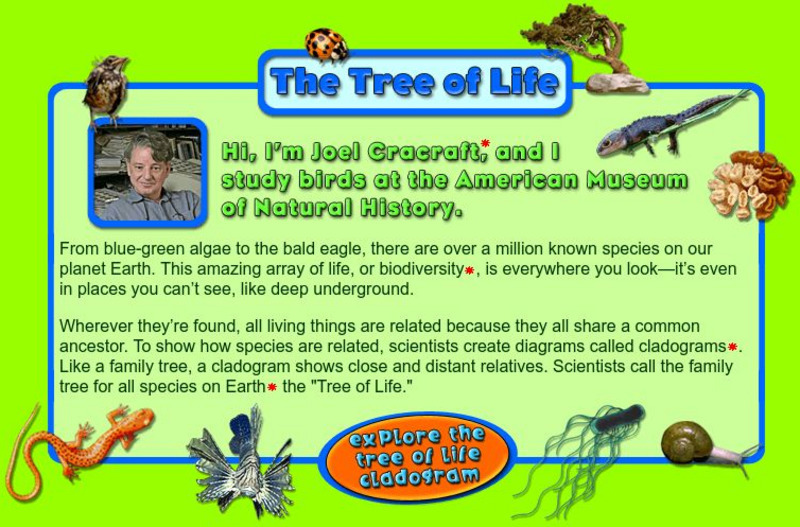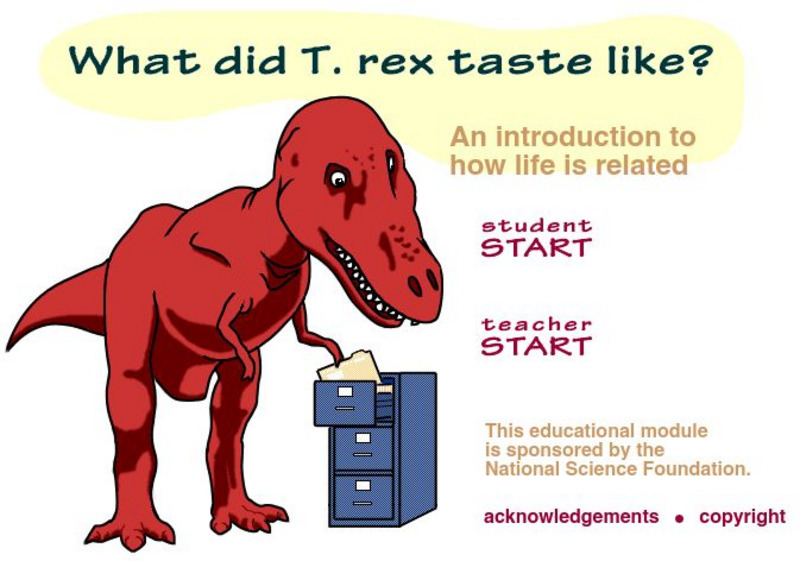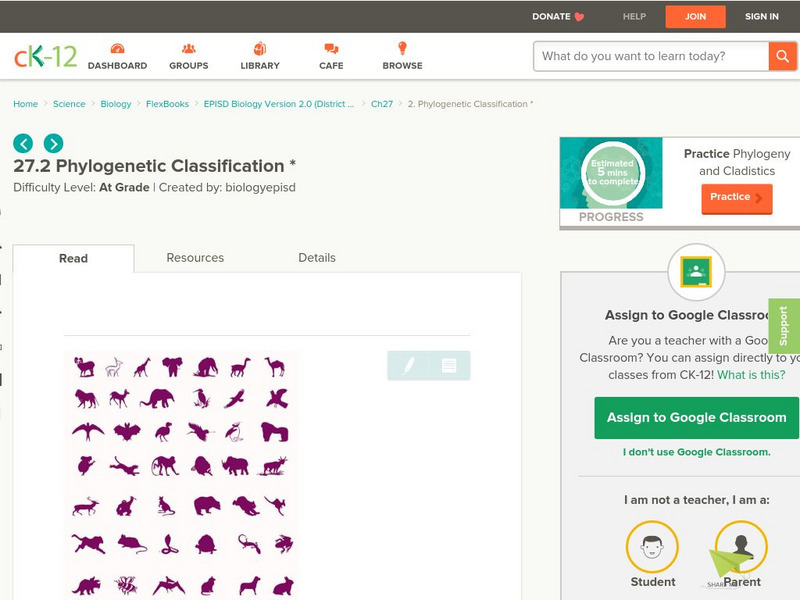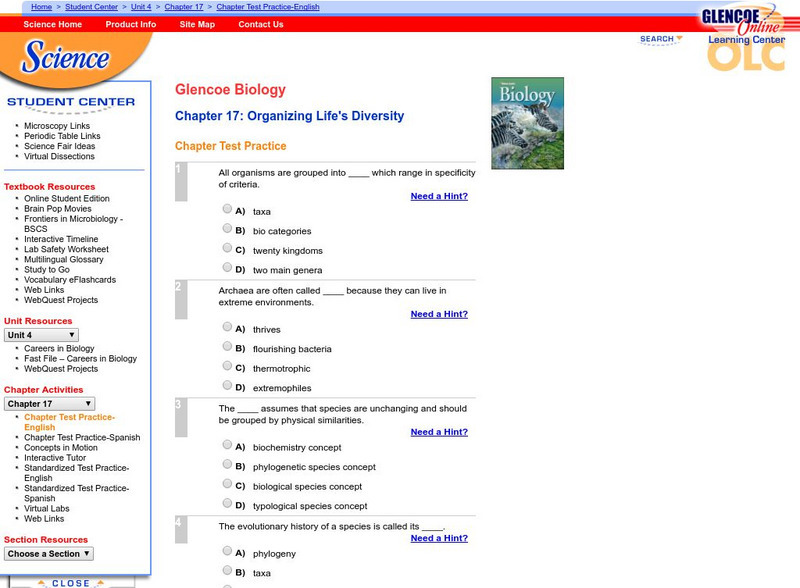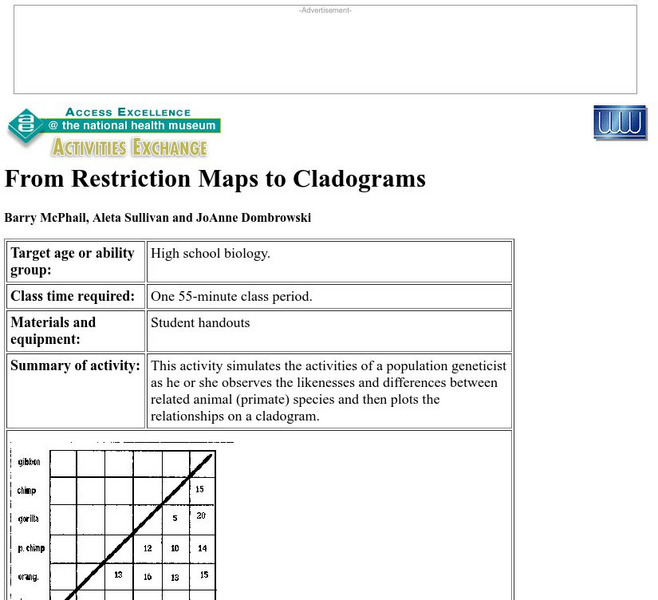Curated OER
AP: Chapter 25: Phylogeny and Systematics
As a review or note taking guide, this resource wraps up a unit on the tree of life. Biology bigwigs define phylogeny and answer questions about the subsequent classification of organisms. The worksheet takes a straightforward and...
Curated OER
Systematics and the Phylogenetic Revolution
This assignment conducts a thorough exploration of systematics. Clearly designed for an AP biology course, questions pertain to taxonomic categories, phylogeny, and construction of cladograms.
Curated OER
Taxonomy - The Science of Naming Organisms
Carolus Linnaeus designed the binomial nomenclature system of naming organisms that is still in use more than 200 years later. By viewing this PowerPoint, upcoming biologists learn how to use it. They are also introduced to the hierarchy...
Curated OER
From Restriction Maps to Cladograms
Biology aces analyze restriction maps to determine the relationships among different primate species and then complete a cladogram. Preface this instructional activity with an explanation of how restriction enzymes are used to create the...
Curated OER
The Six Kingdoms
In this evolution worksheet, students will determine the evolutionary relationships among organisms using cladograms and phylogenetic diagrams. This worksheet has 13 short answer questions and 3 multiple choice questions.
Curated OER
Understanding Cladistics
Young scholars explore cladistics and create a cladogram of their own. They are shown how the scientist at the American Museum of Natural History use a method called cladistics to group animals. Students are asked how the animals (lion,...
Curated OER
Cladograms and Genetics
For this genetics worksheet, students compare the human amino acid sequence with the five animals given. Students used cladograms to complete 11 short answer questions.
Curated OER
Cladistics Is a Zip...Baggie
Students explore how the grouping of organisms based on their shared derived characters forms the basis of a cladogram.
American Museum of Natural History
American Museum of Natural History: O Logy: The Tree of Life
Learn about the diversity of species on Earth by exploring a cladogram, a graph-like tree of life that illustrates relatedness among species. Includes instructions for reading cladograms and a pie chart that summarizes the percentages of...
Science Buddies
Science Buddies: Investigate Native Plant Evolution With Chloroplast Sequencing
Most native plants are not very well studied. One way we learn more about these plants is by studying the species of plants they are most closely related to. In this science project you will sequence part of the chloroplast genome from a...
University of California
Ucmp: What Did T. Rex Taste Like?
The title could be slightly misleading for this site. It is actually a teaching and learning module on the science of cladistics. As they go through the module, students will increase their understanding of, and appreciation for, the...
CK-12 Foundation
Ck 12: Episd: Phylogenetic Classification
[Free Registration/Login may be required to access all resource tools.] Identify the differences between Phylogenetic Classification and the Linnaean Classification systems. Recognize and know how to interpret a phylogenetic tree and a...
McGraw Hill
Mc Graw Hill Higher Education: Classification
This site from McGraw-Hill Higher Education provides links to key terms, lecture notes, and readings on classification, as well as questions from Raven and Johnson's textbook reading on classification.
Biology Corner
Biology Corner: Cladogram Analysis
A lesson plan where students analyze a cladogram to understand a derived characteristics between a group of organisms. After analyzing the prepared cladogram, students create their own.
University of California
Cladistics Notes [Pdf]
Describes readings associated with lecture notes on cladistic classification. Provides definitions of many key vocabulary words used with cladistics.
American Museum of Natural History
American Museum of Natural History: O Logy: Beyond T. Rex
Launch this OLogy link to find a dinosaur cladogram, an illustration that organizes dinosaurs into groups based on the unique characteristics they share, like a three-toed foot.
Estrella Mountain Community College
Online Biology Book: Biological Diversity: Classification
Explore the classification of living things in this online, college-level textbook. Learn about taxonomy and its history through diagrams and descriptive information.
Open Curriculum
Open Curriculum: Phylogenetic Classification
An illustrated article helps students understand the concept of phylogenetic classification.
McGraw Hill
Glencoe Biology: Organizing Life's Diversity: Chapter Test Practice
A fifteen question chapter review covering concepts of the classification of life.
National Health Museum
Nhm: Amino Acid Sequences Show Evolution
This lesson plan focuses on differences in the amino acid sequence of hemoglobin and myoglobin proteins. They use the number of differences to create a phylogenetic tree.
National Health Museum
Access Excellence: Molecular Biology/primate Phylogeny
This lesson plan involves comparison of amino acids to create a phylogenetic tree of primates. Students will also use other species information to draw conclusions about evolutionary relationships.
University of California
Understanding Evolution: The History of Life: Looking at the Patterns
See how scientists use cladistics to study evolutionary relationships.
National Health Museum
Nhm: Restriction Maps to Cladograms Lesson
This lesson plan requires students to analyze DNA restriction maps to determine the differences in the sequence for several primates and humans. They then use the information to create a cladogram.
CK-12 Foundation
Ck 12: Biology: Classifying Organisms Study Guide
This comprehensive study guide covers the main terms and concepts needed for a unit on classifying organisms.










